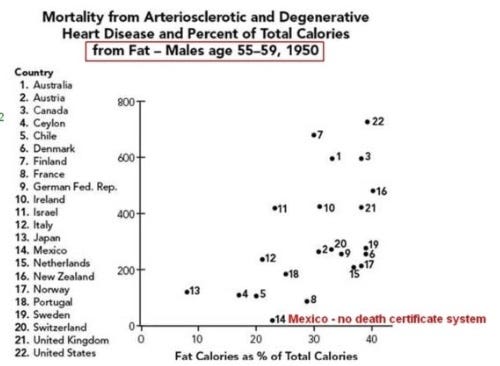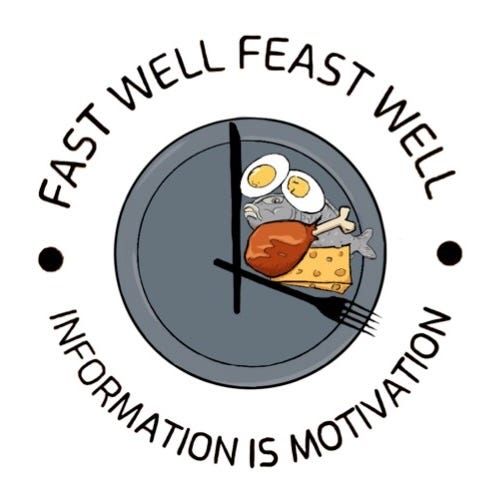The Skinny on Saturated Fat
Why is there so much controversy and confusion over whether or not it's good for us? There's a story behind that.
As the old posts in my archives continue to pile up and I continue to gather new readers, I find it helpful to occasionally circle back to foundational concepts.
One of the reasons I want to do this is because people often mention to me that they feel overwhelmed with the sheer amount of health info bombarding them on the interwebs. Therefore, the more I research, the more I am convinced that part of my role is not just gathering info for you and throwing it at you, but in sorting it, weighing it, and prioritizing it for you.
I have honed my interests quite a bit since I threw myself headlong into health research. At first, I cast a very wide net and read about everything that I could get my hands on. But as I’ve matured, I’ve come up with criteria for sorting what to focus on.
You have many people you could follow on Substack and other social media platforms, and my unique angle is not for everyone. For example, I’m decidedly not a biohacker. It’s not that I’m opposed to other people being biohackers on principle; it’s just my interests lie in a very specific direction.
That direction is making simple changes that have a big health impact.
Here’s a pared-down version of what I’ve learned:
Eat more saturated fat and reduce vegetable and seed oil consumption to as low as possible
Limit ultra processed foods, sugar, and carbs
Eat more salt (post coming soon)
The call to eat more saturated fat is perhaps the most contrary to mainstream messaging of anything in the above list, although everything in the above list is somewhat counter-narrative. This is why one of the most common phrases I use is: “Contrary to everything you’ve ever heard…” and then I say, “You don’t need to eat every 2 hours to stoke your metabolism, salt doesn’t raise blood pressure, animal fat doesn’t cause heart disease, etc, etc.”
But somehow, I find that getting people to believe that saturated fat doesn’t cause heart disease is one of my biggest challenges. I think this is because the fear of fat has been so mercilessly drilled into our heads. So I have to do the uphill work of providing copious counter-evidence. I don’t expect anyone to believe me over the prevailing dogma but to consider how health messaging went so wrong.
So, along those lines, I want to repurpose one of my old posts from the archives. One of the things I love about this post is that it tells an interesting story about our nation, and everyone can relate to a good story.
Note: Nina Teicholz, who has an excellent Substack called Unsettled Science, spent 10 years researching and conducting interviews for her rigorous and compelling book The Big Fat Surprise: Why Butter, Meat, and Cheese Belong in a Healthy Diet which I just finished reading. This post is a summary of her research.
Overview of this post:
Ansel Key’s theory that saturated fat causes heart disease had scientific critics right from the beginning
The Sugar Lobby quietly paid three Harvard researchers to write studies that put the blame for heart disease on saturated fat. This wasn’t fully exposed until 2016 (see NPR article here)
National fear of heart disease led many to flock to Key’s simplistic theory that eating saturated fat caused heart disease
Scientists who dared question Key’s theory were kept from getting grants, couldn’t advance their careers or speak at conferences, and journals wouldn’t publish their research
The data from Key’s “Seven Countries” correlation study could just as easily be explained by lower sugar intakes
A Nation Terrified of Heart Disease
In 1955, President Eisenhower suffered the first of several heart attacks. This event epitomized the nation’s growing fear over the national heart disease epidemic that had appeared almost out of nowhere in the proceeding decades. Heart disease went from being rare in 1900 to the leading cause of death in 1950.
This dramatic new way to die became frightening. We’re used to the idea now but to a generation where it was novel, it was scary to think of walking around with a silent ticking time bomb in your chest knowing you could drop dead at any moment. Fear is a powerful force.
The public demanded that a suspect be charged for this heart disease epidemic, and researcher Ansel Keys made a name for himself by indicting saturated fat. The public was appeased.
Keys, who had a Ph.D. in biology from Berkeley, had been assembling a case against saturated fat, and Eisenhower’s sudden heart attack caused national interest in Keys’ theory. Eisenhower himself believed Keys’ theory that saturated fat was the heart disease villain, as did Eisenhower’s personal cardiologist, Dr. Paul Dudley White. Dr. White warned the public in a front-page Times article to avoid eating saturated fat and cholesterol. Eisenhower told the public he was replacing butter with margarine made from “heart-healthy” vegetable oil.
Keys’ primary evidence that saturated fat caused heart disease came from a study he compiled called “The Seven Countries Study.” Keys believed this study showed a correlation between lower saturated fat consumption and a lower incidence of heart disease. Researchers noted at the time and later that the lower heart disease rates in these countries could more easily be explained by lower sugar and ultra-processed food intake.
But Keys had a fierce personality. Although he faced opposition to his theory right from the beginning, he was “direct to the point of bluntness, critical to the point of skewering,” said his closest colleague Henry Blackburn. Others reported that Keys would argue an idea to the death, with some colleagues calling him arrogant and ruthless. This doggedness made dialogue with him difficult.
Early Opposition to the Idea that Saturated Fat is Bad
Jacob Yerushalmy, founder of the Biostatistics Department at the University of California Berkley, saw Keys speak at the WHO conference in Geneva in 1955 and was not impressed. For example, right there in Geneva, the population ate high amounts of saturated animal fat and had little heart disease, as did the French. The French were eating so much saturated fat and had so little heart disease that this phenomenon became known as the “French Paradox.”
Yerushalmy’s primary criticism of Keys’ work was that he cherry-picked the countries that fit his hypothesis. For example, Keys excluded data from Switzerland, France, Germany, Norway, and Sweden, all countries where people ate high amounts of saturated fat but have low rates of heart disease.
In 1957, Yerushalmy published a paper in which he listed other explanations for Keys’ data including the number of cigarettes sold and the consumption of sugar. Yerushalmy published the following chart showing that when more countries than Keys’ favorite seven were studied, there is no correlation between saturated fat and heart disease:
If You Can’t Win with Facts, Silence the Opposition
One of the reasons why Keys’ theories dominated health for so long is that scientists were strongly discouraged from questioning Keys’ science. Investigative journalist Nina Teicholz interviewed scientists and researchers for her book The Big Fat Surprise. The organic chemist and renowned nutritionist David Kritchevsky explains to Teicholz the reaction he received when he suggested that the recommendations to reduce saturated fat be loosened:
We were jumped on! It’s hard to imagine now the heat of the passion. It was just like we had desecrated the American flag. They were so angry we were going against the suggestions of the American Heart Association and the National Institutes of Health.
After interviewing dozens of researchers, Teicholz reports that:
Researchers who persisted in their challenges [to the theory that saturated fat causes heart disease] found themselves cut off from grants, unable to rise in their professional societies, without invitations to serve on expert panels, and at a loss to find scientific journals that would publish their papers. Their influence was extinguished and their viewpoints lost. As a result, for many years, the public has been presented with the appearance of a uniform scientific consensus on the subject of fat, especially saturated fat.
Evidence that Contradicts Keys’ Theory
Vilhjalmur Stefansson, a Harvard-trained anthropologist, made several journeys to the Canadian Arctic to live with the Inuit, staying with them for up to two years at a time, and eating exactly what they ate. For about nine months of the year, the Inuit ate nothing but caribou with the other three months consisting of salmon and eggs. The Inuit prized the fatty parts of the caribou above the leaner cuts, which they fed to their dogs. Stefansson estimated that roughly 70-80% of the calories in their diet came from saturated fat. Stefansson wrote in his controversial 1946 book Not by Bread Alone that the Inuit ate vegetables only as a last resort. But rather than being nutrient-deprived, the Innuits showed no signs of obesity, heart disease, or illness.
When Stefansson returned to the US, he was excited to share his findings with the scientific and medical community, but his work was met with disbelief. In his frustration, he and a colleague, Dr. Karsten Anderson, decided in 1928 they would eat nothing but fatty meat for a year under the supervision of a team of scientists at Bellevue Hospital in New York City. At the end of one year, the scientists published several papers concluding that they could not find a single thing wrong with their health.
Most surprisingly to the medical community, the two did not contract scurvy despite the fact that they consumed little vitamin C (only what’s available in meat). Similarly, the Inuit also did not develop scurvy, except for the ones who worked for white men and ate their food that included carbohydrates.
A probable explanation for this is that biologists have found that carbs are a less clean-burning fuel for the body than fat. When you eat a diet consisting mostly of saturated fat and protein, the body will use the protein to maintain your lean muscle mass and bone density and will use the fat for fuel. Thus, fat is replacing carbohydrates as the primary energy source.
The process of using fat for energy, called beta-oxidation, involves fewer electron transfers than glucose metabolism. Electron transfers produce byproducts called reactive oxygen species (ROS). Furthermore, fatty acids produce twice the ATP (cell energy) than glucose per molecule. This means that not only is fat more clean-burning, you need to burn less of it.
If the body uses primarily carbs for fuel, it needs the antioxidants found in fruits and vegetables to offset the oxidative stress from burning sugar. So sailors on a long sea voyage consuming mostly gruel but no fresh fruits and vegetables got scurvy.
Stefansson enjoyed his meat-only high saturated fat diet so much that he remained on it for the rest of his life. He was active and in good health until he died at age 82.
Other evidence calls into question the theory that saturated fat leads to heart disease. Gerald Shaper observed that the Samburus tribespeople in Africa drank up to 7 liters of whole milk a day, which contains over a pound of butterfat. They supplemented this milk with, on average, 2 lbs of meat per day but they showed no signs of heart disease.
George V. Mann, a doctor and professor of biochemistry, took a team of researchers from Vanderbilt University to study the Masai people in Africa who ate only meat, milk, and blood (yuck!). The main calories in their diet came from animal fat, and they considered fruits and vegetables fit only for animals. Mann reported that the men in the warrior class ate no fruits or vegetables ever. Yet, not a single Masai had scurvy.
Mann first wondered if exercise alone could account for the fact that the Masai had no heart disease. But he also noticed that the elders sat around idly while allowing the younger men to do the work. After performing electrocardiograms on four hundred Masai men, Mann found no evidence of heart disease. He also did not find any diabetes or cancer. The blood pressure of these men, even the elders, was significantly lower than their American counterparts of similar ages. Their weight was also about 50% lower than Americans of similar ages despite eating copious amounts of saturated fat.
These findings impressed both Mann and Shaper as they realized that people’s blood pressure, blood sugar, and weight need not increase with age and their health need not decline at the same rate it did in the US. Furthermore, the consumption of vast amounts of saturated fat didn’t appear to negatively affect these people.
There are doubtless numerous factors that positively influenced the health of these people: activity levels, time in the sunshine (although that can’t apply to the Inuit), less exposure to pollution, no processed foods, no plastics, and no industrial seed oils. However, this data is at least useful in pointing out that high saturated fat alone does not cause everyone to get heart disease.
Dr. Anthony Chaffee is a family physician who has been eating a strict carnivore diet for 15 years and appears to be in perfect health. He recommends this way of eating to all his patients with autoimmune diseases.
The New England Journal of Medicine published this chart on the rise of autoimmune diseases since the 1950 campaign against saturated fat and in favor of seed oils began:
In the video below, Dr. Chaffee explains that all of his patients with Crohn’s Disease who went on the carnivore diet showed full remission in three months. Many of them showed marked improvement in three weeks. Dr. Chaffee mentions that some studies show that an all-meat diet reduced inflammation in Crohn’s disease patients better than steroids.
So What Does Cause Heart Disease?
Sadly, one advantage Keys’ theory had was that it was so simple even a first-grader could understand it: if you eat fat it will clog your arteries. Furthermore, when you pour hot saturated fat, such as bacon grease, down a drain, it hardens and clogs the drain. It’s easy to imagine that’s what happens inside one’s arteries as well. Perhaps this entire debacle could have been avoided if scientists had kept in mind how incredibly intricate the human body is and had not been content with overly simplistic explanations.
In the post Heart Disease Risk Factors I tackle the latest theories of what does causes heart disease if it’s not fat. Although I try to present the science in a way that is as easy to understand as possible, it’s not so simple that it can be reduced to a slogan. The new theories demand some willingness to take into consideration the coordination of several processes at work in the intricate human body. But for those willing to learn some new ideas, I think you’ll find it fascinating.
In the post Do Seeds Oils Increase Risk of Heart Disease? I cover some data showing that plant sterols found in seed oils cause lesions inside the vascular wall. That theory is interesting because the rise in heart disease correlates with the rise in seed oil consumption. Correlation can never prove causation, of course! I’ve belabored this point many times. But when you combine it with clinical data showing harm from a substance, it shows the possibility of a causal relationship.
Your health journey can’t be about just removing things from your diet like crackers, cookies, and chips. You have to replace those foods with lovely alternatives. And if you labor under the idea that saturated fat is bad, you’ll have precious little left to eat. So go eat some cheese. I mean it.
Leslie








I’m 67 years old. I can remember when my grandparents would sit around on the front porch late in the evening and chew the fat. That was a term that was commonly used as a metaphor for sitting around and talking having discussions, which is partly true. However, my grandmother used to cook up the fat separated, and then later they would sit down and literally chew the fat. It was used as a snack. It was dense with nutrition and energy. And since my grandparents worked a farm, they were never sitting around for very long. When the sun went down they went to bed when the sun came up they were already up. Times have changed both of them live to be well into the late 80s and we’re healthy. my father was put on statins by his doctor for high cholesterol. My mother started using margarine and removing the skin in the fats from all the meat that they would consume wasn’t long before my father began to feel brain fog, lethargic, muscle atrophy, and overall not feeling well because the statins were hurting his liver. He got off of the statins. My mother started using butter and the fats again, even though she didn’t want to my father insisted on it. He recovered and live to be 94 years old and in his right mind to the very end. Everyone must make their own decisions about their health. But considering how healthy my grandparents were and how healthy my parents were after they got off of the statins and the low-fat diet I’m convinced that the traditional way to eat your food prior to the 1900s with work and sleep and the right mindset towards life will benefit you in longevity.
Thank you Leslie for all the hard work you do in research and your drive to share the correct, true information. The history of how things started to go so wrong (Keys, Rockefeller, Kellogg) seems to be gaining traction. Hallelujah! My family experiences were very similar to Darrell’s post; except my mother continued eating margarine and low fat for decades. She died at age 87 and had Alzheimer’s, heart disease. ☹️